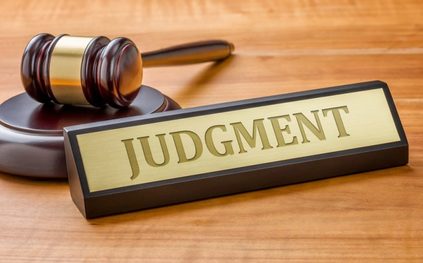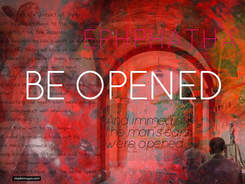
Mark 9:38-50
Sunday, September 30, 2019
© The Rev. Dr. James Campbell
Mark 9:38-50
John said to him, “Teacher, we saw someone casting out demons in your name, and we tried to stop him, because he was not following us.” But Jesus said, “Do not stop him; for no one who does a deed of power in my name will be able soon afterward to speak evil of me. Whoever is not against us is for us. For truly I tell you, whoever gives you a cup of water to drink because you bear the name of Christ will by no means lose the reward.
“If any of you put a stumbling block before one of these little ones who believe in me, it would be better for you if a great millstone were hung around your neck and you were thrown into the sea. If your hand causes you to stumble, cut it off; it is better for you to enter life maimed than to have two hands and to go to hell, to the unquenchable fire. And if your foot causes you to stumble, cut it off; it is better for you to enter life lame than to have two feet and to be thrown into hell. And if your eye causes you to stumble, tear it out; it is better for you to enter the kingdom of God with one eye than to have two eyes and to be thrown into hell, where their worm never dies, and the fire is never quenched.
“For everyone will be salted with fire. Salt is good; but if salt has lost its saltiness, how can you season it? Have salt in yourselves, and be at peace with one another.”
I was raised on a steady diet of meat and potatoes; sunshine and exercise, hell fire and brimstone. Before I ever understood anything about the boundless love of God, I knew all that I would ever need to know about the anger of God. Hell was the subject of frequent sermons and Sunday School lessons and church camps.
This constant emphasis on hell was used largely to keep us all in lock step with the dictates of the church. And the dictates of that church had to do with personal morality. People who drank and smoked and cursed and wore revealing clothing and danced and listened to rock-n-roll were all going to hell. And the hell they were going to was a literal lake of fire, from which there would be no escape. And let me tell you: all that hell-talk used to scare the hell out of me!
Where do those kinds of ideas come from? They come from our holy book. They come from passages like the one we heard today, in which Jesus is purported to describe hell as a place of unquenchable fire.
Well, I threw off the fearful chains of my childhood religion a long time ago now. I came to understand that most hell-fire talk was abusive and used to manipulate and control, to divide and to conquer and to judge. And for those reasons, for most of my career, I have steered a very wide path around the topic of hell.
I’m not the only one who avoids talking about hell. I bet most of you do too. We avoid talking about it for all kinds of reasons. Some of us don’t believe in it, seeing it as the product of more primitive minds. Others of us are happily agnostic about it, not knowing or caring if it’s true and sure that if it is, we’re not going there. And still others of us find talking about it, true or not, a distraction away from the overwhelming message of the Gospel – that God’s essential essence is love.
And that’s true: God is love. But part of love is justice. We may not like to talk about hell but hell is another way to acknowledge that there is a lack of justice in this world. Hell is about, on some level, a desire for things to be made right, for the score to be evened. It’s much easier to dismiss the notion of hell or judgment when you are not the one who suffers at the hands of another. Maybe we don’t talk about hell too much because our lives are not hellish. But people who were intimately acquainted with injustice wrote the Bible. And they longed for a God who would set the world right; a God who would judge in equity; a God who would call human cruelty and selfishness and indifference to account. The oppressed of this world still long for such a God.
At the 50thanniversary of the liberation of Auschwitz, Elie Wiesel offered this prayer invoking the judgment of God: “Those who are here remember the nightly marches [into the gas chambers] of children, and more children, and more children. Frightened, quiet. So quiet and so beautiful. If we could see just one of them our hearts would break. But did it break the hearts of the murderers? O God, O merciful God, do not have pity on those who did not have mercy on Jewish children.”
When I read Wiesel’s words this week, their raw anger and sadness shocked me. But are they really that different from the word’s of Jesus: "If any of you put a stumbling block before one of these little ones who believe in me, it would be better for you if a great millstone were hung around your neck and you were thrown into the depths of the sea.”
Harming little ones - how is it that our fellow humans are capable of such cruelty? Why is it that the history is littered with folks just like us who made this earth a hell for their sisters and brothers? How does that happen? The answer to that question is as complicated as we are. But much of our inhumanity to one another begins very simply. We separate from people we do not understand or like. And then we put them into categories. And then we label them and judge them and finally, as a last step, we dehumanize them. And when we do that, humans are capable of all sorts of hellish behavior – behavior that God will judge.
It’s interesting to me that the separating and labeling of people is the very behavior that introduces Jesus’ talk about hell in this passage. The disciple John was complaining that there was someone else, who was not part of the group, who was casting out demons in Jesus’ name. This guy didn’t look like them or act like them or talk like them. He no doubt did not have his theological ducks in a row. It is quite likely that he even misunderstood who Jesus was. But none of that mattered. What mattered, for Jesus, was that this man was doing good. This “other” went about setting people free from the demons of fear and oppression. He was helping some of the so-called “little ones.” “Don’t stop him,” Jesus said. “He’s on the right track because he’s doing good.”
It seems to me that this unauthorized exorcist was a test for these followers of Jesus, and a very important one. It’s the same test that is put in front of us on a daily basis. Will we believe that God works through the lives of those very different from themselves? Will we let go of control? Will we see goodness in others? Will we cultivate that goodness? It is so very important that we do these things because it is impossible to judge and mistreat those in whom we have seen the goodness of God.
This is what the Lord Jesus modeled for us. He was forever seeing human potential and the image of God in unlikely others. Jesus once commended a Roman soldier for his faith even though that soldier was *the* symbol of an oppressive Empire. Jesus made a despised Samaritan the hero of one of his most memorable stories. Jesus welcomed a marginalized tax collector and a political extremist into the apostolic band. Jesus befriended a disreputable woman at the well. Jesus called Saul, a persecutor of the early church, to become Saint Paul, an evangelist and missionary. In all of these complicated and imperfect people, Jesus saw beyond the outward appearance. And whenever he went, the walls of separation came tumbling down.
Jesus ends this ominous and strange passage with an even stranger sentence: after saying that everyone will be salted with fire, he says: “Have salt in yourself and be at peace with one another.” Scholars readily admit that no one really knows what this salt refers to, but the talk about peace is plain enough. Even when Jesus spoke so openly and vividly about judgment; even when he said that those who mistreat the little ones would be better off drowned; even still, he still refused to let hell have the last word. Even still, he spoke peace.
The Nazis murdered the great German pastor and theologian Dietrich Bonhoeffer. For years he had lived the horror that was the Third Reich. In such a situation most of us would pray that the judgment of God would have the final word. If anybody deserved hell, surely the Nazis did. But this great theologian, whose lifework was studying the Scriptures, wrote that while he believed that divine judgment was real - even so, he said, “judgment (is the) word before (God’s) final word.”
And that means that there’s hope for a sinner like James Campbell – that even when I refuse to cultivate goodness in others; even when I separate them and judge them and dismiss them; even when my actions are worthy of judgment, God does not give up on me. God still has one more thing to say to me. And that, dear friends, most assuredly, is the good news of the Gospel: that even judgment heals us and brings us peace. It purifies us and saves us and the world for something far, far better.
Thanks be to God. Amen.


 RSS Feed
RSS Feed